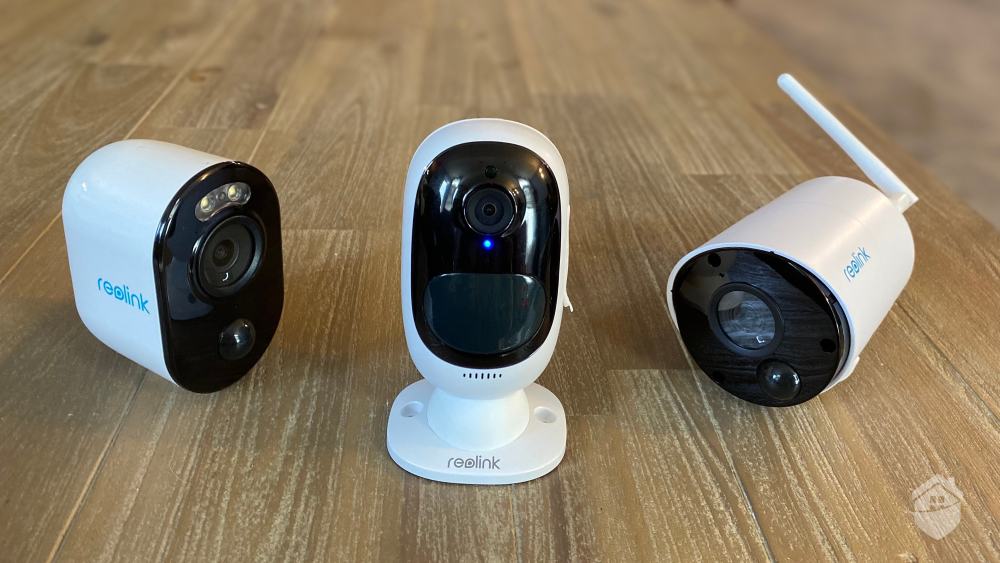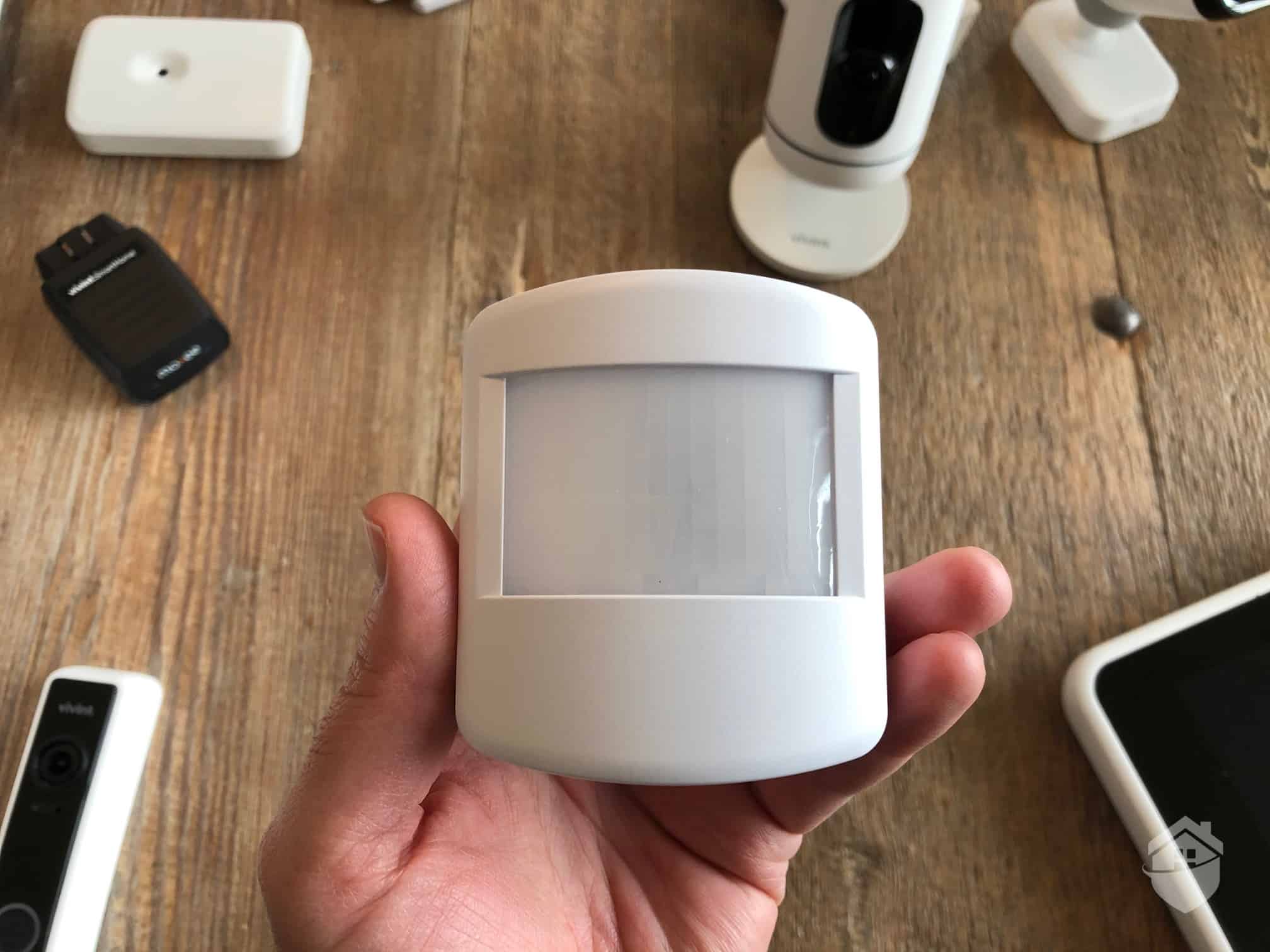There aren’t too many cameras that can match the innovative feature set of a Nest Cam IQ, which, frankly, behaves more like an all-in-one smart home device than a mere camera. Not surprisingly, Nest’s lineup of cameras also includes some of the most expensive individual cameras available today.
To get started, here are a few pros and cons of Nest Cams:
PROS
- Plenty of features
- Simple set up and installation
- Great UI in app
- Exceptional design
- Long battery life
CONS
- Somewhat pricey
- No color night vision
- Resolution just average
But fancy features aside, when I think about the best cameras in the industry, a select few cams I’ve reviewed do have an edge over Nest – in areas like video quality, reliability, app control, and – not to be forgotten – cost.
Today, let’s break down a few security cameras I believe are strong, viable alternatives to Nest.
1. Arlo

Arlo Pro 3, with magnetic charging cable
While they’re not backed by a heavy hitter like Google, Arlo cameras still stand out as a brand of sophisticated, durable wireless equipment, packed with a generous set of features, and an easy-to-use design.
PROS
- Detailed 2K resolution
- AI-driven detections
- Wi-Fi connectivity
- Long battery life
- Great app experience
CONS
- Expensive
- Requires a subscription to access all features
- Mounting hardware a little flimsy
In our hands-on review of Arlo, I admit I was charmed by these well-built cameras, especially with the integrated spotlight, color night vision, wide 160-degree viewing angle, and super HD resolution. Moreover, Arlo’s equipment prices are by and large lower than Nest’s, making them a bit easier on the pocket – though it’s important to look at additional costs for storage and advanced features here, too.
While I always like to remind folks that video resolution is not the sole factor in the performance of your camera, I have to hand it to Arlo here. The Arlo Pro 3 system I tested handled beautifully in 2K resolution and produced crisp, quality footage, as seen in the screenshot below:

Arlo Pro 3 Video Quality
A newer release of Arlo’s, the Arlo Ultra 2, will get you an even more spectacular picture with 4K HDR, combined with an ultra-wide 160-degree viewing angle.
Turning back to Nest Cams, I do want to note that even the cutting-edge IQ camera series maxes out at 1080p resolution. Is this a deficiency? Absolutely not; 1080p is still the industry standard for HD, and you’ll still get plenty of detail and depth from your footage with Nest, not to mention tons of customization.

IQ outdoor cam view
With Nest, I always expect to pay more in terms of individual equipment than other brands, with the Google Nest IQ Outdoor camera retailing for $399. I would be remiss if I didn’t mention that the original Nest Cam starts at $129.99. In terms of today’s competition, this isn’t too expensive.
Judging by our previous experience comparing Arlo to Nest side by side, though, I do have a word of caution should you choose either of these cameras: You’re going to need a pretty strong Wi-Fi connection to keep all that data transmitting smoothly. If you’ve got that, you’re sure to be blown away by the image quality, as well as be impressed overall by your cameras’ performance, no matter what.
FYI: Choosing a camera doesn’t have to be too complicated. For more help choosing the right brand, check out our security camera buying guide.
2. Blink

Blink Outdoor
Blink is one of my favorite entry-level options, and though it’s quite bare bones compared to the technology and features Nest Cams offer, I’ve always been pleasantly surprised by what these simple, under-$100 cams can do.
PROS
- Fully Wireless Cameras
- Easy DIY Installation
- Lightweight, Minimalist Design
- 1080p HD Video Resolution
- Two-Way Talk
- Infrared Night Vision
- Low-Cost Cloud Storage
- Local Video Storage
- Smart Home Integration
CONS
- Lacks Advanced Motion Features
- App Setup Can Be Glitchy
- Relies on Wi-Fi Connection
- No Continuous Recording
- Requires Separate Hub to Connect
Some might know Blink as the younger and more casual sister of Ring security cameras, but Blink is also a strong camera system on its own. Blink doesn’t pack its inventory with dozens of cameras; rather, their cameras represent natural components of a complete system, with just a few devices that you can control, customize, and tailor to your needs.
Pro Tip: Blink cameras have plenty of strengths, but when it comes to automating with non-Amazon devices, they tend to struggle. Some brands don’t always play nice with each other; read our thorough home automation guide to learn more.
On both the equipment and storage side, Blink’s cameras and packages are reasonably priced. You can walk away with a Blink system for not much more than $200; you can cover a few key areas inside and outside your home, with a bonus Blink Mini cam thrown in for a whole host of household needs, and the handy Sync Module.
Pro Tip: Blink cameras have plenty of strengths, but when it comes to automating with non-Amazon devices, they tend to struggle. Some brands don’t always play nice with each other; read our thorough home automation guide to learn more.

Blink Outdoor Camera and Sync Module 2
Of course, the mighty Nest Cam is going to cost you more on the equipment side than Blink. Their Nest Cam Outdoor, which happens to be the most durable camera of the three in our comparison, retails for $199. And with a Nest Aware subscription, expect to tack on another $6-$10 per month for advanced artificial intelligence features and super-secure cloud storage. (It’s Google, remember?)

Nest IQ Indoor Cam
3. Reolink
An industry veteran, Reolink offers a much larger selection of equipment cameras than Nest Cams. In my more recent Reolink camera reviews, I noted a great deal of improvement and ingenuity in Reolink’s battery-powered cameras, including an outstanding Argus 3 Pro camera I tested a few weeks ago.

Reolink Argus 3 Pro
Personally, I like variety so a company like Reolink has much to offer. It’s also clear with Reolink that these aren’t terribly expensive cameras. They’ve always kept costs relatively low, and you have plenty of options to use their cameras without contracts or subscription plans. Or, you can try out one of Reolink’s inexpensive cloud storage plans without signing any contracts.
Did You Know? Reolink’s wire-free cameras run on batteries and do require regular charging. So if you buy a Reolink camera, it’s important to remember to change the battery. Check out our roundup of the best battery-powered cameras for more ideas.
Additionally, almost all of Reolink’s cameras deliver at least 1080p HD resolution. Their Argus series, in newer releases, are equipped with PIR motion sensing technology, which allowed the Reolink cameras I tested to distinguish humans from flying bugs or swaying branches in my front yard.
When it comes to home security, it’s clear that both Reolink and Nest cameras are undoubtedly up to the task. In Nest, however, you’re not going to see the selection and variety of Reolink; the two brands are just different in this way.

Nest Cam IQ indoor and outdoor
Furthermore, Nest Cams don’t run on batteries. I’m no Google spy, but I have a theory that Nest hasn’t adopted the wire-free approach because their tech-heavy cameras would run down a battery way too fast, so it just wouldn’t be practical using them every day.
Price-wise, a high-quality Reolink Argus 3 camera costs $110. That’s pretty on-par for Reolink, and generally less expensive than a Nest Cam.

Reolink Argus 3, Argus 2, and Argus Eco cameras
Final Thoughts on Nest Cam Alternatives
There aren’t too many cameras that can match the precision and technical prowess of a Nest Cam. These cameras bring a new level of intelligence to the entire concept of home security – and that is a very big deal.
But as you might have picked up on by now, these cameras are also pretty expensive. With a Nest camera topping out at almost $400, it’s a relief to know that there are viable alternatives out there, not only among the Blink and Reolink cameras I mentioned above, but across the entire industry as well.
Bottom line here? If you’re looking for the most tech-advanced security cameras available today, Nest is a sure fit. But if reliable, high-quality home security is really all you’re after, you won’t be disappointed with either Blink or Reolink as solid alternatives.









